- Home
- Robin McKinley
Shadows Page 7
Shadows Read online
Page 7
“Jill thinks she’s being tactful,” I said, not sure whether to die of embarrassment or stare into his big brown eyes as a way not to stare at the piece of paper in his hand.
He held it out to me. “I was hoping if I gave you my phone number you would give me yours,” he said, and turned the smile on again. “It is a large enough piece of paper that if you tear off the bottom, you could write yours on it.”
Our hands met as he gave me the paper. So many connections exploded I could feel the smoke coming out of my ears. I could barely write, or remember my phone number—I had to sort of mutter it over to myself so the rhythm would remind me. I could have pulled out my pocket phone, put his number on it, and sent mine to his, but where’s the romance in that? Besides, my hands were shaking so badly I’d probably have pressed the wrong buttons and sent my number to Joe’s Live Bait House, which is a major local landmark on the edge of the barrens, but I didn’t want Joe asking me out for a cup of coffee. It was my pocket number I gave Casimir, of course. I didn’t want Mom or Ran or—worst—Val to answer the ground phone with Casimir on the other end. Supposing he did call, which still seemed to me about as likely as that I’d decide to go to Runyon after all to study physwiz. (It might even be worth living at home, if Casimir was my TA next year.) When I gave him my little piece of paper I could see that at least half the restaurant was watching. Some of the women were really old. He probably did this six times a night every night with different girls. I wasn’t going to think about that.
“Talk to you soon,” I said, and fled.
CHAPTER 4
JILL WAS STILL PUNCHING THE AIR WHEN SHE dropped me off. I went up to the front door smiling—and then noticed that the light was still on in the living room. Shimatta. And toxic pond slime. Margaret Alastrina, I said to myself, pull the circuit breaker. It’s not even eleven yet (quite. It better not be, or I’m in big trouble). They’re just watching television or something.
As Mongo hit me going at full escape-earth’s-atmosphere velocity—oof—my mother appeared at the end of the front hall. Her eyes were red-rimmed. Yabai. Crap zone. I’d forgotten about our conversation earlier. Casimir was suddenly a figment of my imagination. This was reality.
“Hi sweetie,” she said. “Good evening?”
“Yeah. Except for the school-tomorrow part,” I said, petting the ecstatic Mongo (he had to have kangaroo blood, the way he could leap around on his hind legs), and hesitated. If it had just been Mom, I might have told her about Casimir. But I knew she wasn’t alone. Val was in the living room.
I had a moment to think, oh, come on, I don’t know that, I’m just guessing, they’ve been married less than two months, of course they’ve been smooching on the sofa after Ran went to bed. But I did know. I could feel him there as clearly as if I heard him cough. Or maybe it was his shadows I was picking up.
“I was about to make hot chocolate,” said my mother. “Can I make you some?”
It was a peace offering. I knew it was a peace offering. I didn’t want hot chocolate—well, no, I always want hot chocolate, but I didn’t want to drink it with Val, and I did want to go to bed and think about Casimir. Why couldn’t they just leave me alone. I could feel my head start to throb and I wanted to scream and throw things. But I hadn’t had a tantrum in about fifteen years and this probably wasn’t a good time to recharge that old skill.
I felt thirty years old. No, forty.
“Sure,” I said. “That would be great.”
Mom turned to go into the kitchen and I braced myself to join Val in the living room. I could do this. It was okay. Five minutes for Mom to make the hot chocolate. Two minutes to drink it—all right, five. Then I had to walk Mongo. It was a school night. I really did have to go to bed soon.
Where I was standing, about halfway down the front hall (next to the dining room that used to be a garage and the blank wall where the quilt should be), you can see the back of the sofa that faces the TV. You can’t see anyone sitting on it unless they tip their head back or hang an arm over it or something. I couldn’t see Val. He might be sitting in the big chair. Mom might have been sitting on his lap before I came in. It was a good chair for that. Jill used to sit in Eddie’s lap in that chair while Takahiro and I folded little paper things, sitting on the floor next to the coffee table. Eddie used to say things like, Hey, that’s amazing, what you guys can do with paper, that’s a . . . potato chip! I can tell! And that’s . . . Mr. Grass-ass’ ass! Wow!
Eddie always was a broken tool. But he didn’t have shadows.
As I was standing there in the hallway taking deep breaths and telling myself I only had to stay ten minutes, this shadow appeared over the back of the sofa—this long narrow snaky shadow—except it was too fat to be a snake, and it had this jagged outline like feathers or spiky plates or something—it drizzled along the top edge of the back a little ways, waggling back and forth, leaving a trail, or something, dark and shiny as a beetle’s back except as long as your arm. It looked like maybe it was trying to catch my attention, but I was bent over and holding onto Mongo like a drowning person hanging onto a piece of broken boat. Disappointed, I guess, when it reached the end of the sofa, it slithered or unrolled or something down the front, and then oozed across the seat and fell or dripped to the floor. . . .
I’d had it. I’d had it.
I could have done one of two things. I could have screamed, run back out the front door and never come back. I could have become the Phantom of the Shelter, only coming out at night to clean kennels. Or I could get so furious I forgot to be frightened, thinking this monster, this magic user, living in my house, married to my mom—and run forward, straight at the snake-shadow thing, and screamed at Val.
I chose the second.
“What the gods’ holy engines is it with you?” I shouted. “I’m sick of your stupid horrible shadows crawling around! What are they! What are you? What are you doing out there in the shed? What are you? What are you doing here?”
He had started to get up—he was sitting in the big chair—when I came in. It was one of those weird things he did, he stood up when Mom or me or Jill or any woman came into the room. But he kind of froze halfway when I started screaming at him.
There was a crash from the kitchen and Mom appeared in the archway looking like the end of the world, only madder. “Margaret Alastrina, what do you—”
Val finished standing up and said, “Elaine, it is all right.”
Mom said furiously, “It is not all right that she should—”
But Val shook his head and held up his hand. Both hands. And then spread them out. I knew what he meant but it made him more alien. No one in Newworld did stuff like that, any more than Newworld guys stood up when women came in the room. “Maggie—Margaret—will you please tell me what you see?”
I turned my head to look at the sofa. The shadows were gone, of course. There weren’t any on the wall behind Val either. They probably didn’t like being yelled at. (Mongo had followed me and was pressed up against the backs of my legs. He knew I wasn’t yelling at him.) “There’s nothing there! And now you’re going to say that teenage girls are sometimes like this, and it’s okay, I’m just crazy, and then my mother won’t hate me any more, she’ll just have me locked up!” It had been kind of a stressful day. I burst into tears.
I’d’ve stopped if I could—I hated crying in front of Val—but I couldn’t stop. I put my hands over my mouth and made hysterical gagging noises. I saw Val make a move toward me, and then stop before I ran away. Then Mom had her hands—not too gently—on my shoulders, and she pushed me sideways and down, till I sat on the sofa. Probably where the shadow snake had been crawling. I cried harder. My senior year had started, I’d met the most beautiful boy in the world, he liked me, then he turned out to be a physwiz loophead—and not quite two months ago my mother had married a hairy freak with a shadow zoo.
I bit down on my hand and poked
my fingers in my eyes till I could finally stop crying. By then I also had most of a medium-large dog in my lap, licking my elbows and trying to get at my face and whining. Mongo wasn’t allowed on the furniture.
When I opened my sticky eyes there was a box of tissues on the coffee table. Since I could hear banging and clattering noises from the kitchen—some of them sounded like something broken being swept up—I assumed it was Val who’d put the box there. Would one of his shadows bite me if I took a tissue? I’d been passing him the salt or the salad for the last seven months, but then I’d never admitted I could see his—friends either. They might not like being seen. Or maybe by admitting I could see them I’d catch them, like a monster virus. I was now shivering. I wrapped my arms around Mongo. Mongo liked this. His tail started thumping against my leg.
I leaned around Mongo and took a tissue. I didn’t see any shadows. I took several more tissues, blew my nose so hard I nearly started crying again, and tried to dry my face off. This wasn’t easy because Mongo was now trying to help. I petted him, putting off looking at Val, and watched Mongo’s black and white hairs drifting away and attaching themselves to Mom’s pale-gold-and-sage-green sofa cushions.
Little quiet clinks and then footsteps moving from the bare kitchen floor to the hall and living room carpet. The footsteps paused, and an indrawn breath as Mom saw Mongo on the sofa. Footsteps started again (the floor in the hall creaked just there), and then Mom silently set a tray on the table in front of me, pushing the box of tissues to one side. She poured, put one mug in front of me, handed one to Val (murmur of “thank you”), and sat down with a third. She was sitting in the other chair—neutral territory. Not close to me, not close to Val.
The hot chocolate smelled wonderful (my mom makes the best hot chocolate) but I wasn’t sure if I wanted to let go of Mongo long enough to pick up my mug. Dogs are very comforting when your world has exploded.
“Margaret,” said Val at last. “Can you talk?”
I nodded. And then I wanted to be totally sure I was being polite, so I added, “Yes.” Except it came out a croak, so I had to say it again: “Yes.” But totally polite probably meant looking at him, and I couldn’t. I was still staring at the top of Mongo’s head.
“Will you please tell me what you mean about—shadows?”
I thought I was going to tell him—him and Mom—about the snake thing, but what I heard myself saying was: “That first night you came to dinner, last winter. I opened the door and there were like forty of you. You and your shadows. They loomed. They made you look huge. It was like inviting an army in.” They’ll eat all your food and ruin your carpets and you don’t even know whose side they’re on. “And . . .” I trailed off. I couldn’t think of a good adjective. Mom wasn’t yelling at me but I thought she probably wouldn’t like it if I said “scary” or “gruesome” or “some kind of monster.”
“Do you see them often?” said Val in the same calm voice, like he was asking me to pass the salt or the salad.
“Pretty much any time I see you,” I said, a little too quickly. “And there are more and more of them.” I looked up at last, looked at him. There were like hundreds of shadows stuck around the room, mostly behind him, with lots of what looked like twisted legs and distorted heads—except how did I know where one stopped and another one started? Maybe there were only a few that happened to be the size of giant elephant-swallowing anacondas. They were curling around the windows and Mom’s geraniums and Takahiro’s and my paper things, perched on the picture frames, half-tucked behind the legs of furniture, lying raggedly along the gap between the tops of books and the shelf above them. I think I whimpered. I’d never seen them this bad before—never seen this many of them—although they weren’t moving around much, and Val’s shadows usually moved.
These weren’t still though. They wiggled. There were so many of them it was like there was something wrong with my eyes. Have you ever thought about the darkness between a row of books and the top of the shelf? Of course not. You don’t, until it goes all loopy, and little things like legs or tails or tongues hang down over the spines.
Oh gods. Oh gods.
I had my arms around Mongo, and he was leaning against me. I could feel something sharp digging into my breastbone—the broken cog that hung from his collar with the tag that had his pet-registry number on one side and our ground phone number on the other. The scientists cut magic out of us in Newworld two generations ago but they haven’t quite eliminated superstition, and even Station has a charm shop where you can buy stuff like Mongo’s cog. Some charm shops would sell you fetishy things with feathers and twigs and dried flowers, but if you sold too many of those the Overwatch goon squad would probably shut you down. If you stuck to broken chips and dead batteries they left you alone. Mom had bought Mongo’s charm, to my amazement, when he stopped growing and got his first adult collar. She’d laughed a little—that funny non-laugh she had for years after Dad died—and said something weird and grown up about it being a good thing to be normal when you could. I thought of this comment a lot. Mom was not into charms. And her grandmother had been a magician. And one of her sisters had disappeared while she was working for a brain bureau.
I’d always thought most of the physwiz stuff was some kind of grown-up paranoia. The usual rumor around any high school was that the two weeks of physwiz we had to take was some brainwashing thing to make sure we weren’t ever tempted to start making charms out of feathers and twigs and dried flowers or try to wake up the genes for magic we didn’t have any more so what was there to wake up? Newworld was all about science. We were stronger than Oldworld and Midworld and Farworld and the Southworlds and everywhere because we’d got rid of magic, and science had all the important answers.
Everywhere had silverbugs—and everywhere had cobeys, Old, New, Mid, Far and South—but I’d never seen a live one and I didn’t know anyone who had. I knew about the famous ones, of course, the ones even science couldn’t make close up and go away, but since in Newworld the military always had them epically guarded I figured they could be anything. Uncle Darnel was in a cobey guard unit, and he said he had no idea what they were. You got special gear and you did what you were told, he said. It was just a job.
I knew the double R of course—Run and Report—because that was drummed into you from the beginning, with “please” and “thank you” and “don’t throw your oatmeal on the floor if you want to go on living.” But exactly what you were supposed to run and report was always left a little vague. It would look odd. It would be clearly out of place. Apparently you would know it if you saw it—it was maybe like a lot of silverbugs all stuck together. Which made me particularly sure I never wanted to see a real cobey. A mob of silverbugs not all stuck together was too much for me.
But I didn’t know anyone who’d ever been worried enough by an oil spot on the road or a puddle of water where no water should be or a cobweb sparkling with too many prisms to run and report it, although I knew people did occasionally. Well, and there were people like old Mrs. Githers, who ran and reported about once a week. When the local Watch shift were having a slow day they gave her a cup of coffee before they walked her home again.
There was never anything to report around here. Before this summer the last silverbug outbreak had been four years ago in Birdhill, which was nearly thirty miles from here. Jill was right: No Town, No Where, although some of the stories about the old Goat Creek base in the barrens were pretty extreme, and Station got its name from when it used to be mostly the train terminus and where the soldiers went when they were off duty. But they closed Goat Creek down because they didn’t need a big army base here. Station didn’t even have a regular scan any more. The mayor used to make a fuss about getting the sweepers here once a year. Fine. That was the sort of thing mayors were for, with kissing babies at the Fifth of July town gala. The sweepers never found anything and the last few scans had been canceled. We were a low-risk area: the anti-cobey
boxes were enough for us.
I sneaked another look at Val, over the top of Mongo’s head. He was wearing another of his ugliest-ever-seen-in-a-civilized-country shirts. He had a lot of them. He’d sat forward in his chair, his forearms on his thighs and his big hairy hands hanging between his knees. I thought magicians were supposed to have long slender fingers to write mystic runes in the air and twiddle wands and things. His hands looked like they’d be good at strangling people and hammering nails without a hammer. His head was bowed and his shoulders slumped. He looked really tired. Or overwhelmed. Or sad. He looked like someone who’d just heard some bad news he wasn’t expecting. Or maybe he was expecting it, just a little, but it was worse now that he’d heard it.
I was trying to unglue my tongue from the roof of my mouth and for possibly the first time ever say something to Val voluntarily (that didn’t involve shouting). But my mother beat me to it. “Val?” she said, hesitantly, in this little splintery voice.
I heard way too much in that one syllable. I heard how glad she was to have him in her life. How lonely she had been before she met him. How much she loved him. I remembered how much more often she’d laughed in the last few months than she had in all the years since Dad died. In spite of me.
I put my face down on the top of Mongo’s head.
I heard Val stir. “I didn’t know,” he said, so quietly it was almost a whisper. His voice always sounded kind of rough and hairy too, although maybe it was just his accent. “I didn’t know. I did what they told me; I let them . . . Maggie, I have wondered, because . . . but . . .”
I didn’t look up; I didn’t want to see.
He went on: “They told me to go to Newworld. It would be easier here, they said. I already spoke the language. There were jobs for such as I . . . now was. They did not tell me they would let the government steal my money, or that I would not be able to teach, because the schools here would not accept my papers.”

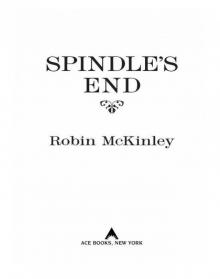 Spindle's End
Spindle's End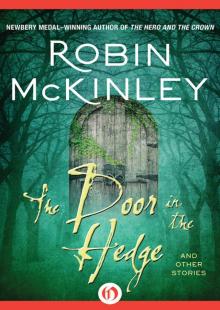 The Door in the Hedge: And Other Stories
The Door in the Hedge: And Other Stories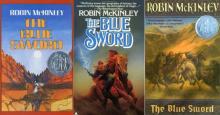 The Blue Sword
The Blue Sword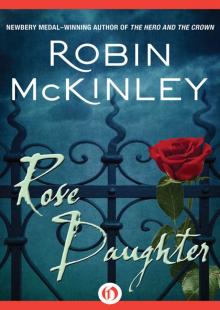 Rose Daughter
Rose Daughter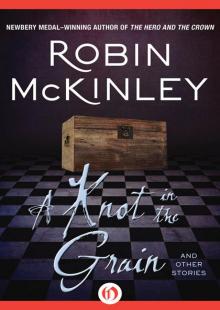 A Knot in the Grain and Other Stories
A Knot in the Grain and Other Stories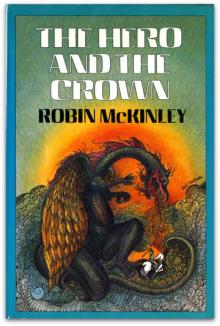 The Hero And The Crown
The Hero And The Crown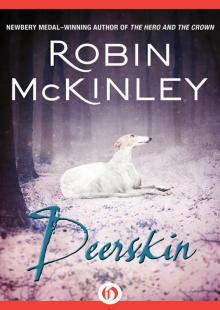 Deerskin
Deerskin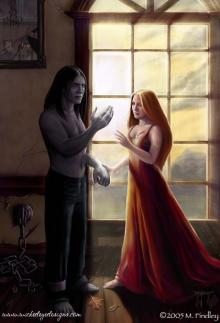 Sunshine
Sunshine Beauty: A Retelling of the Story of Beauty and the Beast
Beauty: A Retelling of the Story of Beauty and the Beast Shadows
Shadows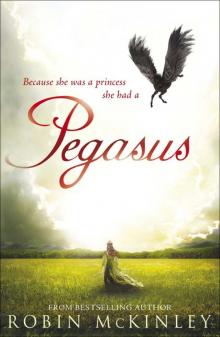 Pegasus
Pegasus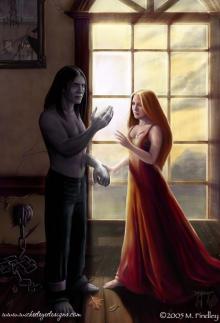 Chalice
Chalice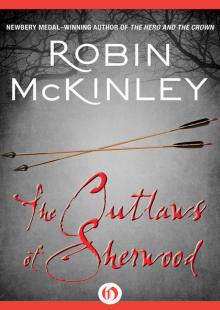 The Outlaws of Sherwood
The Outlaws of Sherwood Fire: Tales of Elemental Spirits
Fire: Tales of Elemental Spirits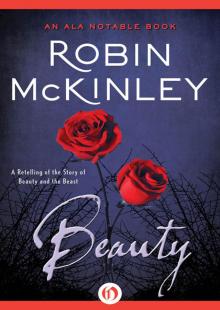 Beauty
Beauty Dragon Haven
Dragon Haven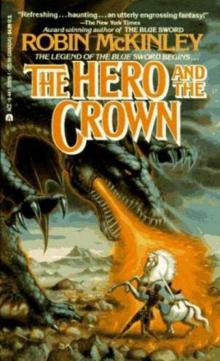 The Hero And The Crown d-2
The Hero And The Crown d-2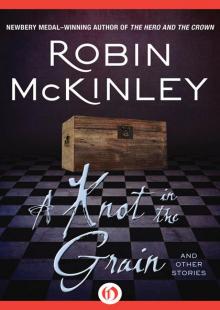 A Knot in the Grain
A Knot in the Grain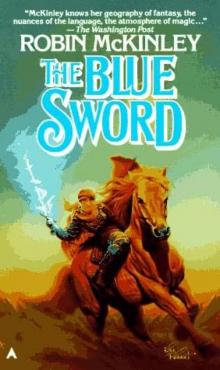 The Blue Sword d-1
The Blue Sword d-1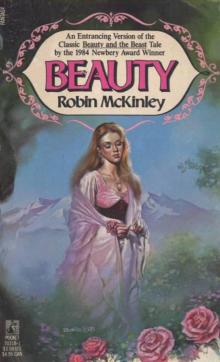 Beauty (v1.2)
Beauty (v1.2)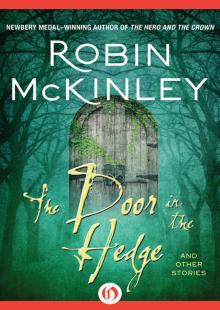 The Door in the Hedge
The Door in the Hedge